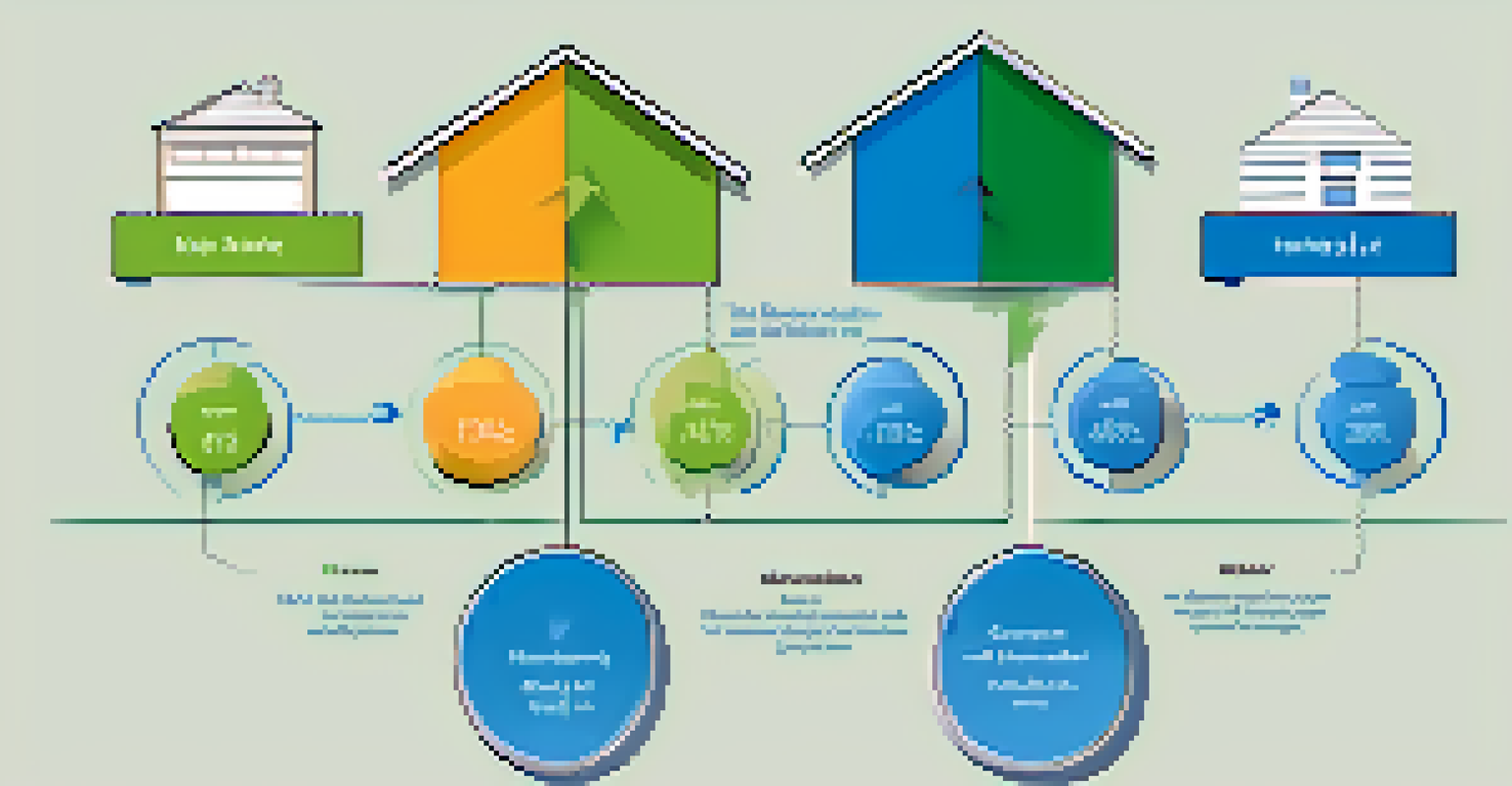How Home Equity Affects Your Credit Score: What to Know

What is Home Equity and Why Does it Matter?
Home equity refers to the portion of your home that you truly own, calculated by subtracting your mortgage balance from your home's current market value. For example, if your home is worth $300,000 and you owe $200,000 on your mortgage, you have $100,000 in equity. This equity is important because it can be tapped into for loans or lines of credit, which can influence your financial health.
Home equity is a powerful tool, but it must be managed wisely to avoid pitfalls.
Understanding your home equity is crucial not just for potential borrowing, but also for your credit score. Lenders consider your equity when assessing your risk as a borrower. The more equity you have, the less risky you appear, which can positively affect your creditworthiness.
Moreover, home equity can be a valuable asset in times of financial need. Whether you're aiming to finance a home renovation or cover unexpected expenses, knowing how much equity you have can open up opportunities that might otherwise be out of reach.
How Home Equity Loans Work
Home equity loans allow you to borrow against the equity you've built up in your home. Typically, these loans offer a lump sum at a fixed interest rate, making them an attractive option for homeowners needing a substantial amount of cash. For example, if you have $50,000 in equity, you might qualify for a loan of that amount to use as you wish.

While home equity loans can provide quick access to funds, they also come with risks. If you're unable to repay the loan, you could end up facing foreclosure, which can severely damage your credit score. It's essential to weigh the benefits against the potential risks before proceeding.
Additionally, because home equity loans are secured against your home, they often have lower interest rates compared to unsecured loans. This can make them a smart choice for those looking to consolidate debt or finance major purchases. However, it’s vital to ensure that you can manage the additional debt responsibly.
The Relationship Between Home Equity and Credit Score
Your credit score is influenced by several factors, including payment history, amounts owed, and the types of credit you use. Home equity plays a role primarily through the amounts owed category, which looks at your total debt compared to your available credit. The more equity you have, the better your debt-to-income ratio can be.
Financial freedom is available to those who learn about it and work for it.
For example, if you have significant equity in your home and take out a home equity line of credit (HELOC), this can help improve your credit utilization ratio if you manage repayments efficiently. Low utilization ratios generally lead to higher credit scores, creating a positive feedback loop.
It's also worth noting that lenders may view home equity as a sign of financial stability. A higher equity amount might indicate that you are more likely to repay debts, leading to better credit terms and rates when you apply for loans or credit cards.
Impact of Home Equity on Credit Utilization Ratio
Credit utilization ratio is a key component of your credit score, representing the amount of credit you use compared to your total available credit. When you tap into your home equity through loans or lines of credit, this can affect your utilization ratio. If you use a significant portion of your available credit, it may negatively impact your score.
For instance, if you take out a HELOC and use a large portion of that credit, it could increase your overall utilization ratio, potentially dropping your credit score. However, if you manage the debt wisely and keep your overall credit utilization low, the impact can be mitigated.
Ultimately, it's about balance. Using your home equity can be beneficial, but it's crucial to maintain a responsible approach to borrowing to protect your credit score.
The Risks of Overleveraging Your Home Equity
While leveraging home equity can provide financial flexibility, overleveraging can lead to significant risks. If you borrow too much against your home and face life changes such as job loss or unexpected expenses, you may struggle to keep up with repayments. This could lead to foreclosure, which is one of the most damaging events for your credit score.
Moreover, overleveraging can make it difficult to sell your home later if the market fluctuates. If you owe more than your home is worth, you may find yourself in a challenging situation, often referred to as being 'underwater' on your mortgage.
It's essential to borrow wisely and only what you can afford to pay back. Keeping your home equity within a safe range can protect both your home and your credit score.
Strategies to Maintain a Healthy Credit Score
Maintaining a healthy credit score while managing home equity involves several strategies. First, make sure to pay all your bills on time, including your mortgage. Late payments can have a negative impact on your credit score and should be avoided at all costs.
Next, consider keeping your total debt levels in check. While it can be tempting to tap into your home equity for large purchases, make sure these expenses are necessary and within your budget. Aim to keep your credit utilization ratio below 30%, which is generally recommended for maintaining a good credit score.
Finally, regularly monitor your credit report for errors or inaccuracies. This can help you identify potential issues early on and correct them before they affect your credit score.
Consulting Experts for Financial Guidance
When navigating the complexities of home equity and credit scores, seeking professional advice can be incredibly beneficial. Financial advisors or credit counselors can provide personalized strategies tailored to your unique financial situation. They can help you understand the potential impacts of leveraging home equity on your credit score and overall financial health.
Additionally, consulting with a mortgage broker can provide insights into the best options available for accessing your home equity while minimizing risks. They can guide you through different loan products and help you choose one that aligns with your goals and financial capabilities.

Ultimately, expert guidance can empower you to make informed decisions that enhance your financial standing while protecting your credit score in the long run.